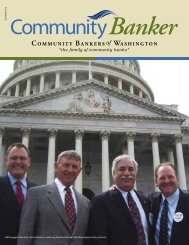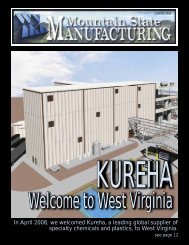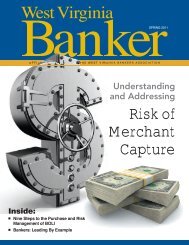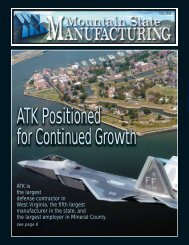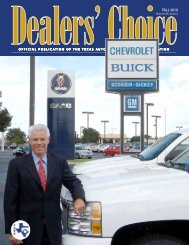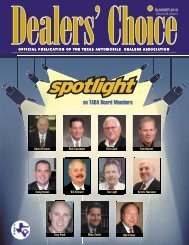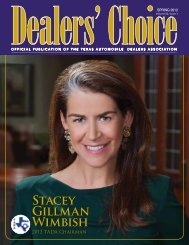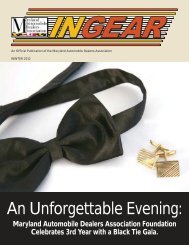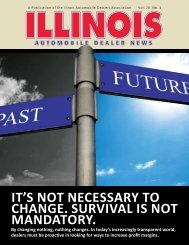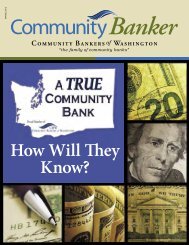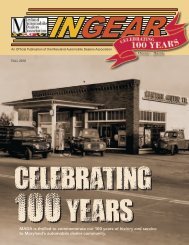official publication of the washington bankers association - Media ...
official publication of the washington bankers association - Media ...
official publication of the washington bankers association - Media ...
Create successful ePaper yourself
Turn your PDF publications into a flip-book with our unique Google optimized e-Paper software.
Serving The Needs Of Washington Bankers Since 1889<br />
Legislative Update<br />
by Denny Eliason, WBA Lobbyist, Alliances Northwest<br />
The 2011 Regular and Special Sessions <strong>of</strong> <strong>the</strong> Legislature<br />
proved to be some <strong>of</strong> <strong>the</strong> most challenging yet for our<br />
industry. Anti-banking bills were at <strong>the</strong> forefront <strong>of</strong> legislative<br />
issues from <strong>the</strong> time lawmakers convened in January through<br />
<strong>the</strong> final days <strong>of</strong> <strong>the</strong> Special Session in May.<br />
Lawmakers adjourned Sine Die on April<br />
22, two days before <strong>the</strong> scheduled end<br />
to <strong>the</strong> 2011 Legislative Session. They<br />
left Olympia without completing <strong>the</strong>ir<br />
most important task – passage <strong>of</strong> <strong>the</strong> 2011-2013<br />
General Fund Budget.<br />
The most controversial issues surrounded<br />
<strong>the</strong> General Fund Budget and <strong>the</strong> numerous<br />
bills necessary to implement <strong>the</strong> many<br />
governing reforms that were being<br />
contemplated to reduce state spending.<br />
Governor Gregoire immediately called lawmakers<br />
back into Special Session. It began on April<br />
26, and lasted for 30 days. The Special Session<br />
was mostly limited to bills related to <strong>the</strong> passage<br />
<strong>of</strong> <strong>the</strong> 2011-2013 General Fund Budget, <strong>the</strong><br />
Transportation Budget and <strong>the</strong> Capital Budget.<br />
The most controversial issues surrounded <strong>the</strong><br />
General Fund Budget and <strong>the</strong> numerous bills<br />
necessary to implement <strong>the</strong> many government<br />
reforms that were being contemplated to reduce<br />
state spending.<br />
The WBA was most exposed during <strong>the</strong> Special<br />
Session in <strong>the</strong> context <strong>of</strong> taxation. (All policy<br />
bills had been resolved to our satisfaction.) Lawmakers<br />
were constrained from raising taxes for<br />
<strong>the</strong> next two years by <strong>the</strong> protections contained<br />
in I-1053, which requires a 2/3 majority to raise<br />
taxes. Legislators could avoid those protections<br />
if <strong>the</strong>y referred any tax measure directly to voters<br />
for approval. There were numerous proposals<br />
aimed at our industry during <strong>the</strong> Special Session,<br />
most <strong>of</strong> which focused on eliminating <strong>the</strong> first<br />
mortgage deduction. Here is a summary <strong>of</strong> some<br />
<strong>of</strong> those measures:<br />
HB 2078 – This bill received<br />
a great deal <strong>of</strong> attention by<br />
lawmakers in <strong>the</strong> House. It was<br />
signed by 48 members <strong>of</strong> <strong>the</strong><br />
Democratic Caucus and sought<br />
to repeal <strong>the</strong> first mortgage deduction<br />
for earnings in excess<br />
<strong>of</strong> $100 million. The estimated<br />
$170 million raised by this<br />
proposal would be dedicated to<br />
K-3 education funding. The bill<br />
received a high pr<strong>of</strong>ile hearing,<br />
and was passed to <strong>the</strong> floor <strong>of</strong> <strong>the</strong> House. Republican<br />
members “locked up” against this measure<br />
and remained steadfast in <strong>the</strong>ir opposition, based<br />
mostly on <strong>the</strong>ir belief that it would raise <strong>the</strong> cost<br />
<strong>of</strong> first mortgage lending.<br />
House Democrats did ultimately bring this<br />
proposal to a vote, and it failed by a 52 to 42<br />
basis, with four <strong>of</strong> our additional “no” votes being<br />
absent. The bill was brought to <strong>the</strong> floor by<br />
Democratic Leadership even though <strong>the</strong>y knew<br />
it would not ultimately receive <strong>the</strong> 2/3 vote necessary<br />
to pass given <strong>the</strong> restrictions <strong>of</strong> I-1053. In <strong>the</strong><br />
near future House Democrats strategically hope<br />
to use this vote when <strong>the</strong>y legally challenge <strong>the</strong><br />
constitutionality <strong>of</strong> <strong>the</strong> Initiative.<br />
The United Financial Lobby worked very<br />
effectively on this issue. All parties held toge<strong>the</strong>r<br />
www.wa<strong>bankers</strong>.com 10<br />
in opposition, even in <strong>the</strong> face <strong>of</strong> amendments<br />
proposed for <strong>the</strong> bill that would exempt smaller<br />
financial institutions.<br />
SB 5945 – Similar to HB 2078, this legislation<br />
sought to remove <strong>the</strong> first mortgage deduction.<br />
The proposal would have removed <strong>the</strong> deduction<br />
for banks doing business in more than ten<br />
states, and thus would only apply to <strong>the</strong> largest<br />
<strong>of</strong> national banks (it remains unclear whe<strong>the</strong>r<br />
<strong>the</strong> bill would have run afoul <strong>of</strong> federal law).<br />
The bill was brought up twice in <strong>the</strong> Ways and<br />
Means Committee, but <strong>the</strong> WBA had intensively<br />
lobbied lawmakers on both sides <strong>of</strong> <strong>the</strong> isle, and<br />
thus it failed to receive a majority vote <strong>of</strong> support<br />
from lawmakers. This vote was critical during<br />
<strong>the</strong> Special Session, but will also be important<br />
if <strong>the</strong>re is a lawsuit challenging I-1053 as it will<br />
signal to a court that a majority <strong>of</strong> lawmakers in<br />
<strong>the</strong> Legislature did in fact oppose repeal <strong>of</strong> this<br />
tax treatment.<br />
SB 5944 – This legislation sought to remove<br />
<strong>the</strong> 2/3 vote protections found in I-1053 for tax<br />
exemptions. The bill had a referendum clause<br />
and thus would only require a simple majority<br />
vote <strong>of</strong> <strong>the</strong> legislature. The WBA worked directly<br />
with <strong>the</strong> rest <strong>of</strong> <strong>the</strong> business community in <strong>the</strong><br />
Senate to ensure <strong>the</strong>re is not a majority <strong>of</strong> votes<br />
available to pass this measure. That said, <strong>the</strong> labor<br />
community and social service groups put on a<br />
full court press in support <strong>of</strong> <strong>the</strong> bill. In <strong>the</strong> end<br />
this issue was hotly debated in <strong>the</strong> Special Session,<br />
but ultimately did not pass.<br />
HB 1768 & HB 2048 – Mortgage Lending<br />
Fee Proposals – During <strong>the</strong> 2011 Session <strong>the</strong><br />
WBA defeated HB 1768. The measure sought to<br />
apply a $48 fee on <strong>the</strong> secondary sale <strong>of</strong> mortgages<br />
to help fund affordable housing programs.<br />
Ultimately our industry agreed not to oppose HB<br />
2048, a measure that would add a $10 fee to <strong>the</strong><br />
recording fees that already exist in our State and<br />
are borne by homebuyers. HB 2048 ultimately<br />
failed to pass during <strong>the</strong> Special Session.



